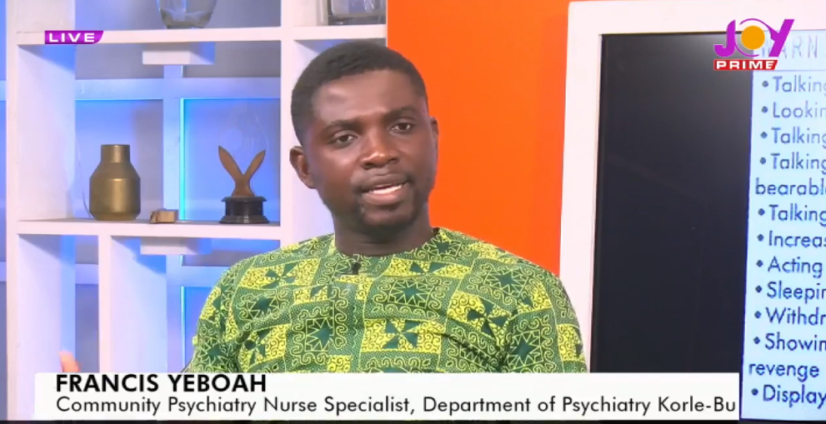
Audio By Carbonatix
A community psychiatry nurse specialist at Korle-Bu Teaching Hospital, Francis Yeboah says people who commit suicide are been selfish.
He said some of the victims always want to satisfy their personal interests instead of considering their family’s legacy.
According to the psychiatrist, most people who decide to engage in suicide fail to consider the aftermath and consequences of the act towards their family.
He made these statements while discussing "Suicidal Patterns and Prevention: The Dynamics and Complications."
"The issue is that there are a lot of dreadful things that happen when you die. When one person commits suicide, it puts about 200 people in an uncomfortable state because, with victims that commit suicide, you realise that the whole family now has this feeling of guilt and shame," he said.
He urged people with suicidal thoughts to consider the wellbeing and legacy of their families after the act adding that it is capable of completely draining an entire family.
He believed dying is not just a solution, but rather leaves untouched issues that can remain with the family for several years.
Also contributing to the conversation, Dr. Abigail Harding, a psychiatrist at the Department of Psychiatry at Korle-Bu Teaching Hospital, indicated that some individuals commit suicide to ease financial challenges but end up destroying their families.
"I had a young man who is of university age, and he thought that by ending it all, he wouldn’t be a burden to his family because they wouldn’t have to pay fees for him to attend school... So he thought ending it all would stop the argument within his family and create peace," she narrated.
She further revealed that the families of suicide victims are at higher risk of also committing suicide after the loss of their loved ones.
This, she said, may be due to mental or behavioural conditions, as it could possibly be a genetic problem.
However, Dr Harding has appealed to societies and authorities to intensify the creation of awareness about stigmatisation so as to inform and educate people on the effects of the act.
Although the outcome of life is unpredictable, people are encouraged to have properly planned goals in a manner that will avoid such thoughts as "nobody knows tomorrow."
People are also encouraged to be open with some of their personal emotions that may be threats to their livelihood to create an avenue for support from society.
In the meantime, here are some warning signs of suicide one must watch out for: talking about wanting to die; increasing use of alcohol or drugs; sleeping too little or too much; talking about feeling hopeless, among others.
Latest Stories
-
Uproar as UG fees skyrocket by over 25% for 2025/2026 session
16 minutes -
Japan PM joins fight for more female toilets in parliament
1 hour -
Ga Mantse declares war on fishing industry child labour
2 hours -
Adom FM’s ‘Strictly Highlife’ lights up La Palm with rhythm and nostalgia in unforgettable experience
3 hours -
OMCs slash fuel prices as cedi gains
4 hours -
Around 40 dead in Swiss ski resort bar fire, police say
4 hours -
AFCON 2025: Aubameyang and Nsue make history among oldest goalscorers
5 hours -
Ghana is rising again – Mahama declares
7 hours -
Firefighters subdue blaze at Accra’s Tudu, officials warn of busy fire season ahead
7 hours -
Luv FM’s Family Party In The Park ends in grand style at Rattray park
7 hours -
Mahama targets digital schools, universal healthcare, and food self-sufficiency in 2026
7 hours -
Ghana’s global image boosted by our world-acclaimed reset agenda – Mahama
8 hours -
Full text: Mahama’s New Year message to the nation
8 hours -
The foundation is laid; now we accelerate and expand in 2026 – Mahama
8 hours -
There is no NPP, CPP nor NDC Ghana, only one Ghana – Mahama
8 hours

